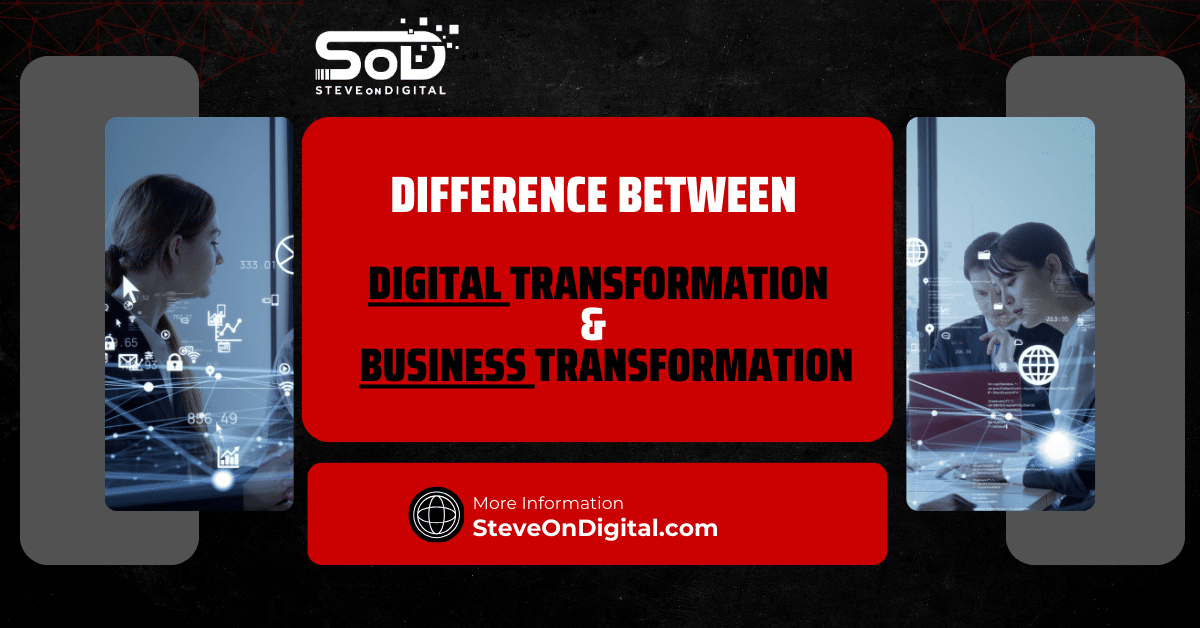Hello, fellow entrepreneurs and small business owners! I’m Steve Johnston, your guide through the ever-evolving landscape of digital transformation.
My journey has been enriched by a deep commitment to family, sports, and continuous learning—values that resonate deeply with the entrepreneurial spirit.
Digital Transformation Imperative
In our journey toward digital excellence, we’re at a pivotal moment where adapting to digital technologies is no longer optional but a necessity for sustained growth and competitiveness.
For small businesses, the digital era presents an unparalleled opportunity to scale and innovate in ways previously unimaginable.
The imperative to embark on this digital transformation journey stems from the need to remain agile in a business environment where change is the only constant.
Limitations Of Traditional IT
Many of us started our entrepreneurial journeys relying on traditional IT infrastructures.
Yet, the costs and challenges of maintaining these on-premises systems have become increasingly apparent.
From the hefty investments in hardware to the complexities of software licenses and updates, the traditional IT setup is both capital and labor-intensive.
This model not only strains our budgets but also diverts valuable resources away from innovation and growth initiatives.
Cloud Computing: A Paradigm Shift
Enter cloud computing—a paradigm shift offering a beacon of hope for small businesses seeking to overcome these hurdles.
Cloud computing has revolutionized the way we access and manage computing resources.
By leveraging cloud technology, businesses can scale services to fit their needs, customize applications, and access cloud services from anywhere with an internet connection.
Comparison Of Traditional IT vs. Cloud Computing
| Feature | Traditional IT | Cloud Computing |
| Initial Costs | High upfront investment in hardware and software | Minimal upfront costs, pay-as-you-go model |
| Scalability | Limited by physical infrastructure | Easily scalable to meet business needs |
| Maintenance | Requires in-house team for updates and repairs | Maintained by the cloud provider |
| Accessibility | Accessible only within the office network | Access from anywhere with an internet connection |
| Security | Dependent on in-house measures | Robust security measures by cloud providers |
| Innovation | Slow due to resource constraints | Fast, leveraging the latest technology |
This introduction to cloud computing is not just about the benefits of cloud computing for small businesses; it’s about recognizing a transformative solution that offers scalability, significant cost savings, and unprecedented opportunities for innovation.
Financial Liberation Through Cloud Computing
Eliminating Upfront Investment
One of the most compelling benefits of cloud computing for small businesses is its ability to eliminate the need for costly upfront investments in hardware and software licenses.
As someone who has navigated the ups and downs of running a digital-centric business, I’ve witnessed firsthand how cloud services have reshaped our financial planning.
Cloud computing allows us to subscribe to cloud computing services and cloud platforms, effectively turning capital expenses into operational costs.
This shift not only frees up capital for other strategic investments but also aligns IT expenses with business growth.
Operational Cost Optimization
The cloud’s pay-as-you-go model is a game-changer for managing IT budgets.
Small businesses can now access a wide range of computing services and only pay for what they use.
This model offers a level of flexibility and efficiency that traditional IT infrastructures simply cannot match.
By optimizing operational costs, small businesses can redirect savings towards areas that drive business value, such as customer relationship management and project management tools, enhancing our ability to streamline business processes.
Maintenance And Upgrade Efficiency
Another area where cloud computing shines is in its maintenance and upgrade efficiency.
Traditionally, a significant portion of our IT resources—both financial and human—was devoted to server maintenance and software upgrades.
By embracing cloud computing and relying on cloud providers for these tasks, we’ve been able to significantly reduce both the direct costs and the opportunity costs associated with in-house IT maintenance.
Cloud computing offers not just savings but also peace of mind, as the responsibility for ensuring the latest security and performance standards now rests with expert cloud service providers.
Collaboration And Operational Transformation
In the heart of today’s digital transformation, small businesses find themselves at a crossroads.
As the owner and author of SteveOnDigital, I’ve navigated these changes firsthand, especially the shift towards more flexible, collaborative work environments enabled by cloud computing.
Let’s dive into how these technologies are reshaping the way small businesses operate.
Remote Work Enablement
The rise of remote work has not just been a trend but a necessity for many, including us in the small business sector.
Cloud computing has been instrumental in this shift, offering the flexibility needed for a healthy work-life balance.
Through cloud technology, employees can access data, tools, and systems from anywhere with an internet connection.
This capability has proven invaluable for maintaining business continuity, especially in challenging times.
My own team’s experience is a testament to how cloud services have allowed us to remain productive and connected, regardless of physical location.
Fostering Real-Time Collaboration
Dynamic teamwork and communication have never been more critical than in today’s fast-paced business environment.
Cloud applications and services enable real-time collaboration, allowing team members to work on the same digital file, share insights, and make decisions swiftly.
Tools such as Google Workspace and Microsoft Office in the cloud have transformed how we approach projects, enabling enhanced collaboration that cuts across geographical boundaries.
This has not only streamlined our business processes but also fostered a culture of innovation and agility.
Creating A Centralized Data Ecosystem
One of the numerous benefits of cloud technology is the ability to create a centralized location for data storage.
This unified approach ensures accuracy and efficiency, crucial for decision-making and operational integrity.
Gone are the days of manual data entry and siloed information.
Now, data from various sources can be integrated and accessed in real-time, providing a comprehensive view of business operations.
This has been a game-changer for us, eliminating data discrepancies and enhancing our ability to respond to market changes promptly.
Scalability And Adaptability For Growth
The journey of a small business is one of constant evolution, facing new challenges and seizing opportunities for growth.
Cloud computing not only supports this journey but accelerates it, offering scalability and adaptability that were once out of reach for businesses like ours.
Dynamic Resource Scaling
The ability to adjust cloud resources in alignment with business needs is a significant advantage.
Whether it’s scaling up during peak seasons or scaling down to reduce costs, cloud technology provides the agility small businesses need to adapt quickly.

This flexibility has been instrumental in our growth, allowing us to manage computing resources efficiently and effectively, ensuring that we’re always positioned to meet our customers’ needs without overextending our budget.
Empowering A Mobile Workforce
As we’ve embraced a more mobile workforce, ensuring productivity across different devices and locations has become paramount.
Cloud computing enables this mobility, allowing employees to access data and applications from any device, anywhere.
This capability supports not just remote work but also provides the agility to respond to business demands on the go.
For our team, this has meant the ability to maintain productivity levels, regardless of physical constraints, fostering a truly adaptable and resilient workforce.
Staying Ahead With Future-Proof Technologies
Lastly, the advent of cloud computing means small businesses can now access the latest technologies without the need for heavy investments in physical infrastructure.
This access to cutting-edge tools and platforms empowers small businesses to innovate and compete at a level playing field with larger companies.
For us, staying ahead of technology trends has been critical to our success, enabling us to offer the best solutions to our clients without the traditional costs associated with upgrading hardware or software licenses.
Enhancing Security And Ensuring Continuity
In the digital age, the security of our business data against emerging threats is paramount.
As Steve Johnston, at the helm of SteveOnDigital, I’ve witnessed firsthand the transformative impact cloud computing has had on enhancing data protection strategies.
Let’s explore how cloud services are bolstering security and ensuring business continuity for small businesses.
Advanced Data Protection Strategies
Cloud computing has ushered in an era of advanced data protection strategies designed to combat modern cybersecurity threats.
Cloud providers employ robust security measures, including encryption, multi-factor authentication, and continuous security updates.
These defenses are critical in protecting against unauthorized access and cyber attacks.
My own experience aligns with the peace of mind that comes from knowing our business data is safeguarded by cutting-edge security protocols, enabling us to focus on growth without the constant worry of data breaches.
Streamlined Disaster Recovery Solutions
The inevitability of unforeseen events – from natural disasters to cyber attacks – means that having a reliable backup and swift recovery mechanism is essential.
Cloud computing offers streamlined disaster recovery solutions that ensure data is continuously backed up and can be quickly restored.
This capability significantly reduces downtime and mitigates the impact of catastrophic data loss.
Through cloud backup services and cloud hosting services, small businesses can leverage offsite cloud storage systems that provide not just storage space but a lifeline in times of crisis.
Risk Mitigation Through Global Data Centers
Cloud services are inherently designed to mitigate risks through the strategic use of global data centers.
These centers, located in multiple locations around the world, ensure that data is redundantly stored.
This distributed approach to cloud storage enhances data safety, as it protects against data loss that could result from a localized event affecting a single data center.
The strategic advantage of this model has been a game-changer for businesses like mine, providing a solid foundation for operational resilience and continuity.
Operational Efficiency And Productivity Gains
The journey towards operational excellence and productivity gains is increasingly being paved by cloud-based solutions.
Here, we delve into how integrating cloud-based business tools, automating processes, and boosting overall productivity are essential components of this journey for small businesses.
Integrating Cloud-Based Business Tools
The integration of cloud-based business tools has revolutionized comprehensive business process management.
From customer relationship management (CRM) systems to accounting software and project management platforms, cloud applications offer a unified approach to managing various aspects of a business.
This not only streamlines business processes but also enhances collaboration across departments.
My own business has benefited immensely from these integrations, enabling us to manage operations more effectively and deliver superior value to our clients.
Automating For Operational Excellence
The power of cloud computing in reducing manual tasks and errors through automation cannot be overstated.
Cloud-based software and services allow small businesses to automate routine tasks, from invoicing and payroll to customer communications and manual data entry.
This automation leads to operational excellence, minimizing human errors and freeing up valuable time that can be redirected towards strategic initiatives.
For my team and me, embracing cloud computing has been pivotal in automating our workflows, significantly enhancing our operational efficiency.
Boosting Productivity Across The Board
Lastly, the overarching benefit of cloud computing for small businesses lies in its ability to boost productivity across the board.
By streamlining operations, reducing errors, and enabling real-time collaboration, cloud technology facilitates a more efficient and productive working environment.
Enhanced collaboration tools and access to cloud data from any device promote a more dynamic and flexible work culture.
This has been my experience as well, where leveraging cloud technology has led to higher efficiency and output, driving growth and success in today’s competitive digital landscape.
Seizing Additional Strategic Advantages
In the realm of small business operations, staying ahead in today’s digital landscape requires not just keeping pace but actively seeking to leverage new advantages.
As the owner of SteveOnDigital, I’ve navigated through numerous tech trends, finding cloud computing to be a transformative ally.

Let’s explore how it unlocks advanced capabilities, ensures our systems remain up-to-date, and elevates customer service.
Unlocking Access To Advanced Capabilities
The journey into cloud computing has bridged the technology gap for small businesses, granting us access to enterprise-grade solutions that were once out of reach.
Cloud technology enables small businesses to employ specialized computer programs and robust security measures without the heavy investment in physical infrastructure.
This democratization of technology allows us to innovate and compete more effectively.
In my experience, adopting cloud services has been akin to gaining a larger team’s capabilities without the associated costs.
Ensuring Up-To-Date Systems
One of the most valued aspects of cloud computing is its capacity for automatic updates.
This feature ensures that small businesses like ours always leverage the latest functionalities and security measures without manual intervention.
It removes the burden of keeping systems up-to-date from our shoulders, allowing us to focus more on core business strategies.
Through cloud computing, we’ve seen firsthand the benefits of always having access to the newest tools and protections, which has significantly reduced our operational risks.
Elevating Customer Service And Engagement
Cloud solutions have revolutionized the way we engage with our customers.
By utilizing cloud-based customer relationship management (CRM) systems and web-based phone systems, we’ve been able to offer a more personalized and responsive service.
These technologies facilitate better customer interaction and satisfaction by ensuring data is readily available, enabling more meaningful connections and faster resolution of inquiries or issues.
This approach has not only improved our customer service metrics but also driven higher levels of customer loyalty and engagement.
Making The Leap: Cloud Adoption And Maximization
Adopting cloud computing is a strategic decision that requires careful planning and execution.
Here’s how small businesses can navigate the transition, from evaluating needs to overcoming adoption challenges.
Evaluating Business Needs And Cloud Options
The first step in adopting cloud computing is to thoroughly assess your business needs and understand the various cloud options available.
This involves identifying the specific challenges and opportunities your business faces and how different cloud solutions can address them.
It’s crucial to select cloud services and providers that align with your business goals and operational requirements.
For my business, this meant prioritizing solutions that offered scalability, data security, and robust support for our digital marketing activities.
Implementing Cloud Computing
Transitioning to the cloud should be approached with a clear strategy, including training for your team and effective change management practices.
Best practices for a smooth transition include starting with a pilot program to test and learn, then scaling up as confidence and familiarity grow.
It’s also essential to engage your team early in the process, providing the necessary training and support to adapt to new systems and workflows.
My journey through implementing cloud solutions has taught me the value of patience and the importance of empowering employees to embrace new technologies.
Overcoming Adoption Challenges
Adopting cloud computing is not without its challenges, including concerns about data security, cost, and the complexity of transitioning existing systems.
Addressing these concerns requires a strategic approach, including selecting reputable cloud service providers with a strong track record for security and reliability.
It also involves careful planning to manage costs and ensure that the transition causes minimal disruption to operations.
In my experience, transparent communication with stakeholders and seeking expert advice when needed have been key to overcoming these challenges.
Cloud Computing Adoption Steps
| Step | Action Items |
| 1. Evaluate Needs | Identify business requirements and challenges that cloud computing can address. |
| 2. Research Options | Explore different cloud services and providers to find the best fit. |
| 3. Plan Transition | Develop a strategic plan for cloud implementation, including a timeline and resources. |
| 4. Train Team | Provide training and resources to ensure smooth adoption by all team members. |
| 5. Implement and Scale | Start with a pilot program, then expand cloud usage as confidence grows. |
| 6. Monitor and Adjust | Continuously monitor cloud services and adjust resources as needed for optimal performance. |
Harnessing Cloud Computing For Unparalleled Growth
In an era where digital transformation is not just beneficial but essential for survival and success, small businesses are increasingly turning to cloud computing as the backbone of their operations.
This strategic pivot is not merely about adopting new technology; it’s about reimagining how business is done.
Cloud Computing: Empowering Small Businesses With Big Technology
Cloud computing levels the playing field, allowing small businesses to access sophisticated computing services, data storage solutions, and robust security measures once reserved for larger corporations.
By embracing cloud technology, small businesses can significantly reduce physical storage space and operational costs, streamlining business processes and enhancing productivity.
Cloud services, from cloud hosting services to cloud-based tools, are revolutionizing how small businesses approach project management, customer relationship management, and disaster recovery.
With an internet connection, cloud platforms enable seamless access to data, fostering enhanced collaboration among teams, regardless of their location.

This not only boosts efficiency but also ensures that small businesses can compete more effectively in today’s digital landscape.
Moreover, the adoption of hybrid cloud solutions and cloud backup services provides a safeguard against catastrophic data loss, ensuring business continuity under any circumstances.
By partnering with reputable cloud providers, small businesses gain access to the latest cloud computing technology and data security protocols, guaranteeing that their operations are both cutting-edge and secure.
Navigating The Future With Cloud Computing
As we stand on the brink of a new era in digital innovation, my role as Steve Johnston, the founder of SteveOnDigital, has been to guide small businesses through the technological landscape, emphasizing the transformative power of cloud computing.
The journey ahead is filled with emerging cloud innovations that promise to reshape the way we do business.
Exploring Emerging Cloud Innovations
The future of cloud technology is incredibly exciting, offering a glimpse into possibilities that were once deemed science fiction.
As we look forward, it’s crucial for small businesses to stay informed about the latest advancements in cloud computing, such as artificial intelligence (AI) capabilities, machine learning algorithms, and advanced data analytics.
These innovations can provide small businesses with the tools to anticipate market trends, improve decision-making, and deliver exceptional customer experiences.
My journey through the digital landscape has taught me the importance of being adaptable and forward-thinking, preparing to harness these emerging technologies to stay ahead.
Leveraging Cloud For Competitive Advantage
Cloud computing is not just a tool for operational efficiency; it’s a strategic asset that can foster innovation and a competitive edge.
By leveraging cloud technology, small businesses can quickly deploy new products, scale operations globally, and tap into new markets with minimal upfront costs.
Strategies such as developing cloud-native applications or utilizing the cloud for big data analytics can drive significant business innovation.
In my experience, adopting a cloud-first approach has enabled SteveOnDigital to remain agile, responsive to customer needs, and innovative in offering solutions that distinguish us from competitors.
Conclusion
Reflecting on the journey of digital transformation, it’s clear that cloud computing has been a pivotal force in modernizing small businesses, empowering them to achieve more with less.
The benefits of cloud computing for small businesses are numerous, ranging from cost savings and operational efficiency to enhanced security and scalability.
Benefits Of Cloud Computing For Small Businesses
| Benefit | Description |
| Cost Efficiency | Reduces physical infrastructure costs and converts capital expenditure to operational expenditure. |
| Scalability and Flexibility | Resources can be scaled up or down based on demand, offering flexibility. |
| Enhanced Collaboration | Allows team members to collaborate in real-time from any location. |
| Improved Security | Provides advanced security features to protect against cyber threats. |
| Disaster Recovery and Continuity | Ensures business continuity with effective data backup and recovery solutions. |
| Access to Latest Innovations | Small businesses can leverage the latest technology without significant investment in infrastructure. |
The Competitive Imperative
In today’s fast-paced digital landscape, the adoption of cloud computing is no longer a luxury but a competitive imperative.
Cloud technology enables businesses to thrive, providing the agility and innovation necessary to meet the demands of a rapidly changing market.
As small business owners, embracing cloud computing is crucial for staying relevant and competitive, ensuring we can seize new opportunities and navigate challenges with confidence.
Call To Action: Embrace The Cloud
To my fellow small business owners and entrepreneurs, the message is clear: the future is cloud-driven, and embracing cloud computing is essential for our continued success.
The journey towards digital transformation is a stepping stone towards achieving sustained success in an increasingly digital world.
I encourage you to explore cloud solutions tailored to your business needs, invest in understanding and adopting this technology, and leverage the cloud as a catalyst for your business transformation.
As we move forward, let’s not shy away from the opportunities that cloud computing presents.
Instead, let’s harness its power to innovate, compete, and thrive in the digital era. The journey with cloud computing is an ongoing adventure, filled with potential for growth, innovation, and transformation.
Join me, Steve Johnston, on this journey, and let’s navigate the future of our businesses with confidence and optimism, empowered by the cloud.




